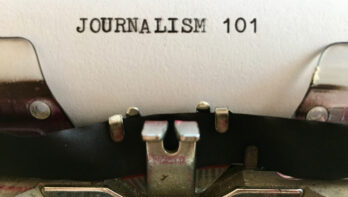
By Jennifer Matenaer
Dear Diary, . . .” Growing up I recorded everything: first crushes in fourth grade, pretend superheroes in the woods, sleepovers with best friends. But my experience stretches beyond elementary-school love and outdoor adventures. I continue to use it not only to chronicle my thoughts but also to grow as a writer. Whether you filled diaries or never even owned one, journaling has benefits for everyone, especially writers.
The Why: Consistency and Creativity
Writing takes lots and lots of consistent practice, filling page after page of blue-lined notebook paper, scratching through several words and sentences, then balling it up and swooshing it into the wired trash bin. Journaling allows writers to fill page after page with ideas and musings—minus the crossing out and crumbling.
In Bird by Bird, Anne Lamott discusses the importance of really rough first drafts. Think of each entry as “the child’s draft, where you let it all pour out and then let it romp all over the place, knowing that no one is going to see it.” Almost like a private blog post, journaling rough drafts gives you practice without pressure.
Journaling also fosters creativity. Whenever you get stuck on an assignment, imagine yourself walking into a library of ideas. You page through various topics, choose a prompt, and dive into your next blog post, devotional, or magazine article. A journal is a personal catalog that combats writer’s block and generates content for future pieces. And the longer and more frequently you log your life, the more your library catalog grows.
Recording your thoughts also revives your imagination. On some days, working on a project feels anything but artistic, especially after typing, backspacing, and retyping the same sentence fifty-seven times. Switching to a different subject and medium can refresh the mind. Inspiration arises through the consistent brainstorming of keeping a diary.
The How: Have Fun!
To simplify the process of documenting your life, focus on having fun. There are no rules. Make sure it feels like a hobby rather than a chore.
The medium greatly affects your mindset. When hearing the term diary, most think of the traditional hardbound book with an engraved monogram and fabric bookmark. But you only need a simple notebook—or just a piece of paper—to approach this old-fashioned type of journaling. If you don’t know where else to begin, start here.
If the “dear-diary” format doesn’t interest you, consider going digital. You can type entries on your laptop through Google Docs or other platforms. Shift to your thumbs, using an app on your smartphone. Or rotate between multiple devices, making it even more portable (e.g., Microsoft OneNote or Apple Notes).
If you need a break from writing altogether, think of a more audiovisual option. Capture pictures worth a thousand words. Produce a private podcast. Or vlog about your day. Although the AV approach eliminates practice, it generates plenty of content, allowing you to stay in a “What’s next?” mindset for future projects.
Maybe you want to use paper but get bored with sentences on line after line after line. Skip the words and describe your life through doodles. Grab a sketchbook and some pens, markers, paint, pencils, crayons, or chalk. Once again, although you aren’t writing, you are taking a break and getting inspired each time you draw or paint or sketch.
You can also combine forms. Download an app to draw out sentences with your finger or stylus. Mix words with doodles through clustering or mapping. Add captions to pictures, maybe even developing a memoir of memes. Create a year-long video of snippets and titles using 1 Second Everyday. Or use magazine clip art, fancy fonts, and doodles to design a smash journal. Anyone can find or create a method that works for them. And if you get bored with one method, try out a new one.
The no-rule approach also relates to Anne Lamott’s recommendation for first drafts. Since no one will see your diary, you don’t have to worry about what others think.
You can jot down anything: an idea that popped into your mind, the dream you had last night, the crazy conversation you overheard at the grocery store. And you don’t have to be a professional podcaster, photographer, or artist to use the medium. It’s ok if you talk with a vocal fry, take blurry photos, or draw a cow that might look more like a mud puddle.
Grammar also takes a backseat. Use “be” verbs to your heart’s content. Concoct the longest run-on sentence and end it with five exclamation marks. No erasers or backspaces or Ctrl+Z’s. Remove limitations and find inspiration through having fun.
“Dear Diary, . . .” Maybe those two words now evoke ideas of an outlet in your career or a technique to grow in your craft. As a writer and long-time filler-of-diaries, I have benefited through recording my life. And I would encourage all freelancers to start their own journaling journey.
Jennifer Matenaer is a freelance writer in southwest Iowa. Upon graduating from Dallas Theological Seminary, she and her husband began serving as missionaries in rural church revitalization. Through writing both fiction and nonfiction, she seeks to remind and encourage readers that they are God’s creative image-bearers with a story to tell. Read more from her at jennifermatenaer.com.
Posted Dec. 7, 2023





